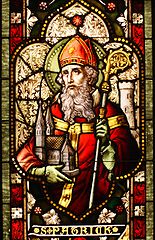
The Life And Writings Of Saint Patrick -Saint Patrick
II.—THE EPISTLE TO COROTICUS
The EPISTLE TO COROTICUS was also called ‘The Second Book of St. Patrick,’ and sometimes ‘The Second Book of St. Patrick’s Epistles’—the First Book being the Confession. It is, without doubt, the genuine composition of the Saint, for, not only is the style and ‘flavour’ of both ‘Letters’ the same, but sometimes entire phrases are reproduced from the Confession, showing that both came from the same mind and the same hand. It is not found in the Book of Armagh, although Muirchu’s story of the ‘King of Aloo’ shows that he was aware of the existence of this Letter. We have, however, several early MS. copies dating as far back as the tenth century.
It is much more likely that this Coroticus was King of Dumbarton, or Ail-Cluade, that is of the Strathclyde Britons, than of Cardigan, in South Wales. The Strathclyde Britons were fellow-citizens of Patrick, as we have seen, which gives point to the reference in this Letter where he says he will call them fellow-citizens no longer, on account of their crimes and associations with the ‘apostate Picts and Scots’—a phrase that shows of itself that the reference is rather to a King of Strathclyde, who was their neighbour, than to a certain Ceredig, in South Wales, who was far away from them. Those Picts and Scots (of Scotland) were converted by the preaching of St. Ninian, of Candida Casa, but afterwards fell away from the faith, or, at most, were only half-Christian, like Coroticus himself.
The incursion on the Irish shores which called forth this indignant letter of Patrick, probably took place towards the close of our Saint’s life, and very likely somewhere on the coast of Down or Antrim; most probably the former. Patrick may have been in Saul at the time, and would thus have an opportunity of hearing all about the bloody raid of the pirates from the Clyde. The raiders were merciless in the extreme. The white garments of the neophytes were stained with their own blood and the blood of their slaughtered companions. Numbers of men and women were carried off into slavery, whilst the holy oil of Confirmation was yet glistening on their foreheads. The Letter is written in a spirit of mingled grief and indignation, extremely touching, because it reveals in a most striking way the deep and ardent affection which Patrick had for his flock. He entrusted the delivery of the Letter to a priest—whom he tells us he had taught from his infancy—with instructions to read it for the soldiers of the tyrant, and then hand them the document itself to be perused at their leisure. It was a perilous task for the messenger to undertake, for it contained what was virtually an excommunication of Coroticus himself and his abettors, since the Saint called upon all true Christians not to receive their alms, nor associate with them, nor take food or drink in their company.
Many incidental references are made by the Saint in this Letter to his own personal history. It was purely for God’s sake he preached the Gospel to the Irish people—forgetful of all the claims of flesh and blood—to the nation who once took him captive and harried the men-servants and maid-servants of his father’s house. By birth the son of a Decurion, for their sake he sold or forfeited his nobility, making himself a slave of Christ for the service of a foreign nation. It was the custom with the Gaulish and Roman Christians to pay large sums for the ransom of Christian captives—“but you—you mercilessly slay them or sell them to infidels, sending the living members of Christ, as it were, into a brothel. Have you any fear of God; what Christian can aid you and abet you in your crimes?”
Then, in language of passionate grief, he bewails the fate of the captives. “Oh! my most beautiful and loving brothers and children, whom in countless numbers I have begotten for Christ, what shall I do for you? Am I so unworthy in the sight of God and men that I cannot help you? Is it a crime to have been born in Ireland? And have not we the same God as they have? I sorrow for you; yet I rejoice, for, if you have been taken out of the world, yet you were believers through me, and are gone to paradise.” And, last of all, he commands his Letter to be read in the presence of all the people, yea, and in the hearing of Coroticus himself, that God may inspire them with a desire to amend their wicked lives, and liberate, at least, the women captives, who were baptised in Christ. The Letter, like the Confession, abounds in quotations from the Old Italian Version of the Scriptures.
Muirchu, in the Book of Armagh, has a reference to this conflict of Patrick with the King of ‘Aloo,’ whom he calls Coirthech, and Corictic. Both, however, are the same name. As the impenitent tyrant was sitting on his throne, listening to the chanting of a magic or druidical song, at a certain point of the recitation he came down from his throne, and, in the sight of all, was changed into the shape of a fox, which, running off like a stream of water, disappeared for ever from the eyes of men.

 Keep Site Running
Keep Site Running